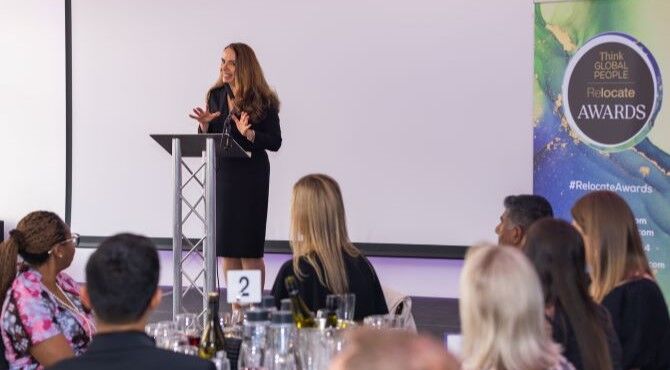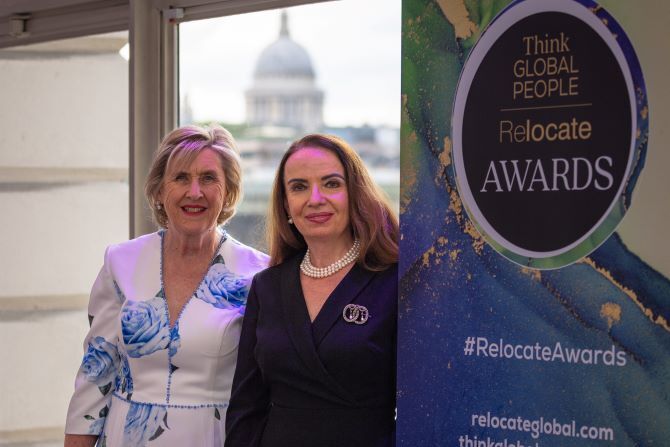From apathy to engagement – how to make changes that benefit your organisation and your employees via the Management Shift
When Professor Dame Vlatka Hlupic took the stage at the Relocate Global and Think Global People Awards Gala Dinner and Ceremony at Glaziers Hall in London, she didn’t begin her keynote speech with statistics or corporate jargon. Instead, she began with a story of how as a young girl in Croatia, she had set up a homemade blackboard in her living room in order to help her friends with their homework after school.

<<Awards home page
“That was the beginning of my conscious leadership journey, and of a life of service, empowerment and education,” she explained. Professor Hlupic then summarised her findings from three decades of academic and corporate research, and explained how different layers of organisational culture can motivate or destroy employee enthusiasm and business innovation. Her message was clear - if you change the way you lead, you can dramatically improve innovation, performance, and profit, and see real change within a short time period in your professional life and in your organisation. The journey towards more inclusive leadership and a happier and more productive workforce is made possible by what she calls The Management Shift.
The change to leadership practice that delivers outstanding results
Professor Hlupic has distilled years of interdisciplinary research into a simple yet transformative model, which is a four to five level framework that maps how individual leaders and and organisational cultures evolve.“Every level is characterised by specific thinking patterns, and by emotions, energy, the language used, leadership style and organisational outcomes,” she explained. “We can't skip the levels. We can only go up one level at a time, but there are pockets of different levels within the same organisation. Once you understand this, you will not be able to unlearn it or unsee it. You will start seeing the world through lens of these five levels.”Her methodology begins at Level 1, where organisations have a lifeless mindset and an apathetic culture. Think fear, toxicity, and stagnation. Employees at this level often suffer in silence, and there is no innovation or collaboration, no sharing of ideas, and no enthusiasm for work or workplace culture.“Not much gets done,” she said. “There is a lot of fear and worry and blame. It is a very unhealthy place, and nobody likes to be there. People just want to escape.”Level 2 is barely better. It is where employees do the minimum. They show up in body, but their minds are long gone.“They would rather do anything else but being at work,” she said. A quick nod to the television series The Office explains the point — these workplaces have a culture of clock-watching, cynicism and avoidance.“At Level 2, the mindset is reluctant, and culture is stagnating, and this is where people do a bare minimum, just to be paid, Professor Hlupic says. “They bring their body to work, but their heart and mind stay somewhere else. They will sneak out for long lunch breaks.”Then comes Level 3. It is orderly, efficient, and appears on the surface to be productive. However, if you dig deeper you will find rigid control, micromanagement, and a business paying a heavy price, that is, stifled innovation and talent that is planning to look elsewhere for job and personal fulfilment.“Knowledge workers don’t like to be micromanaged,” Professor Hlupic warned. “The research shows that they will go somewhere else, even for a lower salary.”At Level 3, organisations are often led by big bosses who have big egos as well, she said, and who manage rules and regulations and who control the culture.“Sometimes we need elements of Level Three for safety, security and compliance purposes,” Professor Hlupic said. “But if we are stuck at level three as organisation, there will be lack of innovation, and there will be lack of purpose and passion for work. In most cases, you will not be able to retain talent, especially knowledge workers.”She explained that knowledge workers don't like to be micromanaged. They need to be treated as associates, not as subordinates. If they are not treated as individuals with needs they will just withdraw silently their cooperation and go somewhere else.The answer to this leadership and corporate malaise and waste of human talent is Level 4, where the real transformation takes place. Here, the mindset is enthusiastic, and the culture is innovative and collaborative. It is a working environment where trust replaces fear, purpose fuels performance, and teams don’t just survive, but thrive and work together.“When the shift to Level Four happens, the keywords are trust, transparency, purpose, collaboration, giving back to society, having fun, working on something bigger than ourselves,” she explained.According to Professor Hlupic, this is where everything improves — innovation, engagement, wellbeing, and profit. She has seen profits double within a year when the organisations she works with fully embrace this shift.“The big shift is when leaders, employees and the entire culture shifts from Level Three to Level Four, she explained. “Then something magical happens and everything changes and everything gets better. Not only that, we create happier and healthier workplaces, and that is priceless, because we know from many research studies that people get sick from stress from work.”She emphasised that leadership really is important, and that it can change lives and change organisations. At Level Four, compassionate and insightful leadership enables you to lead from London, Nairobi or Lagos or anywhere in the world.“There is a choice of being stuck at lower levels and creating miserable employees who want to escape, or creating happy, healthy, thriving workplace with conscious leadership based on the values of compassion, collaboration, networking, integrity, all these values and purpose,” she said.“We know that companies that are based on purpose, are not only more productive and engaging places, but also they have more customers. Customers want to buy from companies that are driven by a higher purpose, and from companies that want to make this world a better place.“These principles are borderless and they are timeless. You can take them with you, like I took mine when I relocated from Croatia to the UK. Leadership is not about what we do, it is about who we are.”Related articles
- Leading with purpose: A life of leadership and innovation
- Think Women’s 40 Outstanding Global Women 2025 | Vlatka Hlupic
- Awards 2025 Keynote Speaker - Beyond Borders: Conscious Leadership and Creative Connections for Global Impact

A leadership revolution that starts with you
For younger generations, this is even more vital. In response to a question from the audience about Gen Z, many of whom are about to join the workforce, Professor Hlupic explained: “They want purpose. They want feedback. They want opportunities to grow. And if they don’t get that, they will move to another job.”The culture of an organisation is also strategically important, she said. It defines the mission and the purpose of the business, and the experience that employees will have when they join. That is why Professor Hlupic has developed an Organisational Health Scan, which is a diagnostic tool that helps companies identify cultural pain points and take action to improve.Professor Hlupic explained that although this shift might sound as though it only works if managers and the C-suite embrace it, she emphasised how each one of us has the power to act as catalysts for the shift to begin. Change doesn’t just start from the top, it can also spread from every level in an organisation. Professor Hlupic shared a striking example from her book Humane Capital, in which she interviewed 58 leaders globally from all over the world, where a mid-level manager in a French pharmaceutical company challenged the status quo with a bold email about board diversity. Her message went viral internally. At first the CEO ignored it, but it had started a ripple, and months later, she had a new role, a published book,and then later became an independent consultant and received an award from the French president.“It all started with one short email,” Professor Hlupic said. “Be aware how powerful each and every one of you are. You can start to create the ripples of change. I have always been of the mindset: be the change that you want to see in the world.”Leadership without borders but with a change in mindset
Professor Hlupic has applied her Management Shift model with great success in multinational organisations across continents.“We can relocate the mindset,” she said. “We can give them the same vocabulary and align them around the same level four culture, regardless of their national cultures.”Although everyone can contribute to change within organsations, it is the leaders who can make the real systemic difference, but only if they are willing to change the culture and themselves in the process.“It is very important that is starts from the top, and then it spreads elsewhere in organisation,” she explained. “The Management Shift as a method and as a system for transformation is agnostic to any culture, location, industry, or size of organisation. I have worked with multi-national organisations globally, as well as smaller businesses.”As she closed her speech, Professor Hlupic offered a challenge — not just to leaders, but to everyone. “Let’s shift. Let’s connect. Let’s lead with conscious leadership to make this world a better place. When I relocated from Croatia to London I took all these conscious leadership principles with me, which are based on service, empowerment and compassion.“If leaders operate from Level Four behaviour and language, it will spread like a ripple, and then they will elevate others.”Professor Hlupic was the keynote speaker for the annual Relocate and Think Global People Awards. These prestigious awards showcase and celebrate achievement across the dynamic international management, HR and mobility sectors. The awards evening was a fantastic time to network, have lively conversations and engage with colleagues in the industry.Three takeaways for business leaders:
- You can make a difference at every level of your organisation
- Cultural change benefits business, profit and employees
- Embracing the process of the Management Shift can lead to profound change and innovation in personal and professional terms
Professor Dame Vlatka Ariaana Hlupic was our Keynote Speaker at our Awards Ceremony and Gala Dinner on 4 June 2025 in London
Read Professor Hlupic's Think Global Women’s
80 Outstanding Global Women page


Find out more about the Think Global People and Think Women community and events.
Subscribe to Relocate Extra, our monthly newsletter, to get all the latest international assignments and global mobility news.Relocate’s new Global Mobility Toolkit provides free information, practical advice and support for HR, global mobility managers and global teams operating overseas.
©2026 Re:locate magazine, published by Profile Locations, Spray Hill, Hastings Road, Lamberhurst, Kent TN3 8JB. All rights reserved. This publication (or any part thereof) may not be reproduced in any form without the prior written permission of Profile Locations. Profile Locations accepts no liability for the accuracy of the contents or any opinions expressed herein.


































